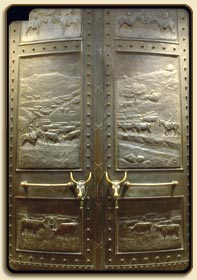|
Overview
PUF Beneficiaries
The University of Texas System
UT Arlington
UT Austin
UT Dallas
UT El Paso
UT Permian Basin
UT San Antonio
UT Tyler
UT Southwestern Medical Center at Dallas
UT Medical Branch at Galveston
UT Health Science Center at Houston
UT Health Science Center at San Antonio
UT M. D. Anderson Cancer Center
UT Health Center at Tyler
The Texas A&M University System
Prairie View A&M University
Tarleton State University
The Texas A&M University
Texas A&M at Galveston
The Texas A&M University Health Science Center
Texas Agricultural Experiment Station
Texas Agricultural Extension Service - Texas Cooperative Extension
Texas Engineering Experiment Station
Texas Engineering Extension Service
Texas Forest Service
Texas Transportation Institute
Overview
Totaling $11.7 billion, the Permanent University Fund (PUF) is a public endowment contributing to the support of 18 institutions and 6 agencies in The University of Texas System (UT System) and The Texas A&M University System (TAMU System). The Texas Constitution of 1876 established the PUF through the appropriation of land grants previously designated to The University of Texas, as well as an additional one million acres. Another state grant of one million acres was made in 1883.
PUF Lands, which today consist of more than 2.1 million acres located primarily in 19 counties in West Texas, are managed by the UT System under the direction of its Board of Regents. In administering PUF Lands, the UT System's mission is to generate income and apply intensive conservation measures to maintain and/or improve the productivity of the lands for the benefit of the PUF. In keeping with this purpose, the lands are managed to produce two streams of income: one from oil, gas, and mineral interests, and the other from surface interests such as grazing.
Surface acreage of the sparsely populated PUF Lands has been leased primarily for grazing and easements for power lines and pipelines. As mandated by the Constitution, all surface lease income is deposited in the Available University Fund (AUF). Mineral income generated by PUF Lands consists primarily of bonuses and rentals from the periodic sale of mineral leases, and royalties on gross revenues from oil, gas, and sulphur production. The Constitution requires that all income from the sale of PUF Lands and leasing of mineral interests be retained within the PUF and invested in PUF Investments.
 |
|
The University of Texas System
|
Distributions from PUF Investments to the AUF are allocated two-thirds for the benefit of eligible institutions of the UT System and one-third for the benefit of eligible institutions of the TAMU System. PUF distributions paid to the AUF are expended by each university system to fund two major programs as follows:
Debt Service on PUF Bonds Issued to Fund Capital Expenditures
The Constitution authorizes the Board of Regents of The University of Texas System (UT Board) and the Board of Regents of Texas A&M Board (A&M Board) to issue bonds (PUF bonds) payable from their respective interests in PUF distributions. PUF Bonds are issued to finance construction and renovation projects, major library acquisitions, and educational and research equipment at the 18 eligible campuses and six agencies of the UT and TAMU Systems. The UT Board and the A&M Board are constitutionally authorized to issue bonds secured by each system's interest in PUF distributions in an amount not to exceed 20% and 10%, respectively, of the book value of PUF assets at the time of issuance. The $1,472 million of outstanding PUF bonds were rated AAA, Aaa and AAA by Fitch Ratings, Moody's Investors Service, Inc., and Standard & Poor's Inc., respectively, as of fiscal year end.
Academic Excellence Programs
PUF distributions, after payment of debt service on PUF bonds, are used to fund academic excellence programs at UT Austin, Texas A&M University, and Prairie View A&M University. Expenditures for excellence programs encompass library enhancements, specialized science and engineering equipment, student counseling services, graduate student fellowships, and
National Merit and other scholarships. In combination, these activities enhance the universities' competitive posture as they seek to attract the best scholars in fulfilling their roles as world-class academic and research universities
|
 |